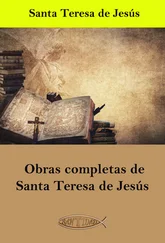26. This I speak of lasts but a moment; yet, as the impulse and the upraising of the spirit were vehement, and though the other faculties bestir themselves again, the will continues absorbed, and causes this operation in the body, as if it were the absolute mistress; for now that the two other faculties are restless, and attempt to disturb it, it takes care--for if it is to have enemies, the fewer the better--that the senses also shall not trouble it: and thus it comes to pass that the senses are suspended; for so our Lord wills it. And for the most part the eyes are closed, though we may not wish to close them; and if occasionally they remain open, as I said just now, the soul neither discerns nor considers what it sees.
27. What the body then can do here is still less in order that, when the faculties come together again, there may not be so much to do. Let him, therefore, to whom our Lord has granted this grace, be not discouraged when he finds himself in this state--the body under constraint for many hours, the understanding and the memory occasionally astray. The truth is that, in general, they are inebriated with the praises of God, or with searching to comprehend or understand that which has passed over them. And yet even for this they are not thoroughly awake, but are rather like one who has slept long, and dreamed, and is hardly yet awake.
28. I dwell so long on this point because I know that there are persons now, even in this place, 24to whom our Lord is granting these graces; and if their directors have had no experience in the matter, they will think, perhaps, that they must be as dead persons during the trance--and they will think so the more if they have no learning. It is piteous to see what those confessors who do not understand this make people suffer. I shall speak of it by and by. 25Perhaps I do not know what I am saying. You, my father, will understand it, if I am at all correct; for our Lord has admitted you to the experience of it: yet, because that experience is not very great, it may be, perhaps, that you have not considered the matter so much as I have done.
29. So then, though I do all I can, my body has no strength to move for some time; the soul took it all away. Very often, too, he who was before sickly and full of pain remains healthy, and even stronger; for it is something great that is given to the soul in rapture; and sometimes, as I have said already, 26our Lord will have the body rejoice, because it is obedient in that which the soul requires of it. When we recover our consciousness, the faculties may remain, if the rapture has been deep, for a day or two, and even for three days, so absorbed, or as if stunned,--so much so, as to be in appearance no longer themselves.
30. Here comes the pain of returning to this life; here it is the wings of the soul grew, to enable it to fly so high: the weak feathers are fallen off. Now the standard of Christ is raised up aloft, which seems to be nothing else but the going up, or the carrying up, of the Captain of the fort to the highest tower of it, there to raise up the standard of God. The soul, as in a place of safety, looks down on those below; it fears no dangers now--yea, rather, it courts them, as one assured beforehand of victory. It sees most clearly how lightly are the things of this world to be esteemed, and the nothingness thereof. The soul now seeks not, and possesses not, any other will but that of doing our Lord's will, 27and so it prays Him to let it be so; it gives to Him the keys of its own will. Lo, the gardener is now become the commander of a fortress! The soul will do nothing but the will of our Lord; it will not act as the owner even of itself, nor of anything, not even of a single apple in the orchard; only, if there be any good thing in the garden, it is at His Majesty's disposal; for from henceforth the soul will have nothing of its own,--all it seeks is to do everything for His glory, and according to His will.
31. This is really the way in which these things come to pass; if the raptures be true raptures, the fruits and advantages spoken of abide in the soul; but if they did not, I should have great doubts about their being from God--yea, rather, I should be afraid they were those frenzies of which St. Vincent speaks. 28I have seen it myself, and I know it by experience, that the soul in rapture is mistress of everything, and acquires such freedom in one hour, and even in less, as to be unable to recognize itself. It sees distinctly that all this does not belong to it, neither knows it how it came to possess so great a good; but it clearly perceives the very great blessing which every one of these raptures always brings. No one will believe this who has not had experience of it, and so they do not believe the poor soul: they saw it lately so wicked, and now they see it pretend to things of so high an order; for it is not satisfied with serving our Lord in the common way,--it must do so forthwith in the highest way it can. They consider this a temptation and a folly; yet they would not be astonished, if they knew that it comes not from the soul, but from our Lord, to whom it has given up the keys of its will.
32. For my part, I believe that a soul which has reached this state neither speaks nor acts of itself, but rather that the supreme King takes care of all it has to do. O my God, how clear is the meaning of those words, and what good reason the Psalmist had, and all the world will ever have, to pray for the wings of a dove! 29It is plain that this is the flight of the spirit rising upwards above all created things, and chiefly above itself: but it is a sweet flight, a delicious flight--a flight without noise.
33. Oh, what power that soul possesses which our Lord raises to this state! how it looks down upon everything, entangled by nothing! how ashamed it is of the time when it was entangled! how it is amazed at its own blindness! how it pities those who are still in darkness, especially if they are men of prayer, and have received consolations from God! It would like to cry out to them, that they might be made to see the delusions they are in: and, indeed, it does so now and then; and then a thousand persecutions fall upon it as a shower. People consider it wanting in humility, and think it means to teach those from whom it should learn, particularly if it be a woman. Hence its condemnation; and not without reason; because they know not how strong the influence is that moves it. The soul at times cannot help itself; nor can it refrain from undeceiving those it loves, and whom it longs to see delivered out of the prison of this life; for that state in which the soul itself had been before neither is, nor seems to be, anything else but a prison.
34. The soul is weary of the days during which it respected points of honour, and the delusion which led it to believe that to be honour which the world calls by that name; now it sees it to be the greatest lie, and that we are all walking therein. It understands that true honour is not delusive, but real, esteeming that which is worthy of esteem, and despising that which is despicable; for everything is nothing, and less than nothing, whatever passeth away, and is not pleasing unto God. The soul laughs at itself when it thinks of the time in which it regarded money, and desired to possess it,--though, as to this, I verily believe that I never had to confess such a fault; it was fault enough to have regarded money at all. If I could purchase with money the blessings which I possess, I should make much of it; but it is plain that these blessings are gained by abandoning all things.
35. What is there that is procurable by this money which we desire? Is it anything of worth, and anything lasting? Why, then, do we desire it? A dismal resting place it provides, which costs so dear! Very often it obtains for us hell itself, fire everlasting, and torments without end. Oh, if all men would but regard it as profitless dross, how peaceful the world would be! how free from bargaining! How friendly all men would be one with another, if no regard were paid to honour and money! I believe it would be a remedy for everything.
Читать дальше












